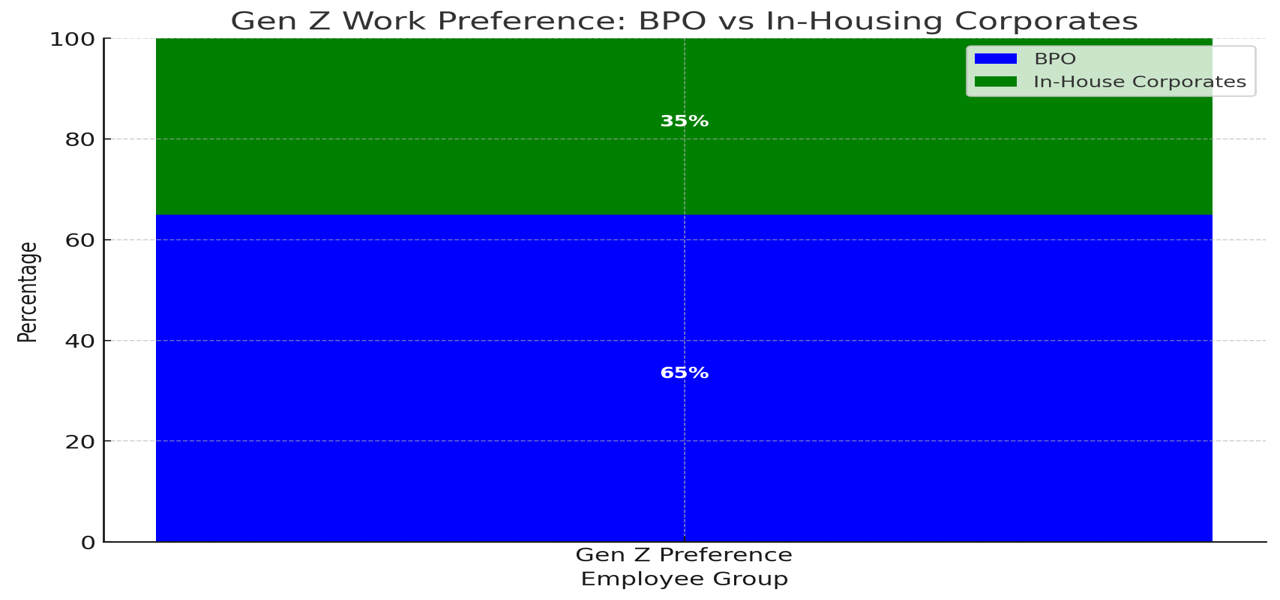

In the continuously changing world of Business Process Outsourcing (BPO), adjusting communication tactics to fit Gen Z preferences has become critical. Gen Z, born between 1997 and 2012, is the first generation to become completely digitally native, with particular qualities and expectations that distinguish them from their predecessors.

Building a Gen Z friendly culture within BPO has become an essential due to their increased interests to work in corporates, whereas the statistics suggest that 65% of Gen Zs would prefer working in a BPO in comparison to in-house corporates.
Moreover, there are an array of reasons as to why Gen Zs choose BPOs over in-housing; one of them being the diverse and versatile work opportunities that they can take part in while engaging themselves in the work they like, and some principal reasons that draw their attention to BPOs can be listed as such;

Despite Gen Zs preferring BPOs due all the perks and benefits, integrating a BPO work culture into a Gen Z friendly environment can be challenging, which is why the first step towards creating a Gen Z friendly BPO should be the embracement of digital platforms.
Furthermore, most of the Gen Zs grew in a digital environment and they are comfortable using social media, instant messaging, and video calls. To create a communication climate that resonates with Gen Z employees, BPOs must include these digital platforms into their regular activities. Tools such as Slack, Microsoft Teams, and WhatsApp may enable immediate, informal, and effective communication, which aligns with Gen Zs demand for rapid and direct connections.
Gen Z values transparency in communication, as they come across a variety of fake identities in social media and real life who crave for attention, which has caused to create a type of insecurity among the Gen Zs, which is why they value honesty and sincerity from their employers more than any preceding generation. BPOs may address this by being transparent about their aims, problems, and results. Regular town halls, clear performance measures, and open feedback forums may all assist to adopt a culture of trust and honesty among Gen Z employees, making them feel valued and involved.
The regular 9-to-5 workweek is becoming a thing of the past, particularly for a BPO. Gen Z employees prefer flexible work hours and task autonomy. Implementing flexible working hours and remote work options can greatly increase job satisfaction among this population. Furthermore, empowering Gen Z employees by giving them decision-making and problem-solving responsibilities can boost engagement and productivity.

Nevertheless, identifying the strong performance times of different Gen Z individuals can also increase the work performance of the BPO, as it enables a BPO to provide 24/7 services with their ideal employees, without reshuffling the same group which could lead them to a burn out.
Adapting BPO communication to be Gen Z friendly requires more than simply incorporating front-line technologies and trends. It is about building a work atmosphere that promotes openness, flexibility, cooperation, and personal development. Understanding and supporting Gen Z employees' specific requirements and preferences allows BPOs to not only enhance operational efficiency but also promote a more inclusive, engaging, and gratifying workplace culture. By doing so, they will not only attract the greatest people from this new generation, but also lay the groundwork for future success in an increasingly competitive market.